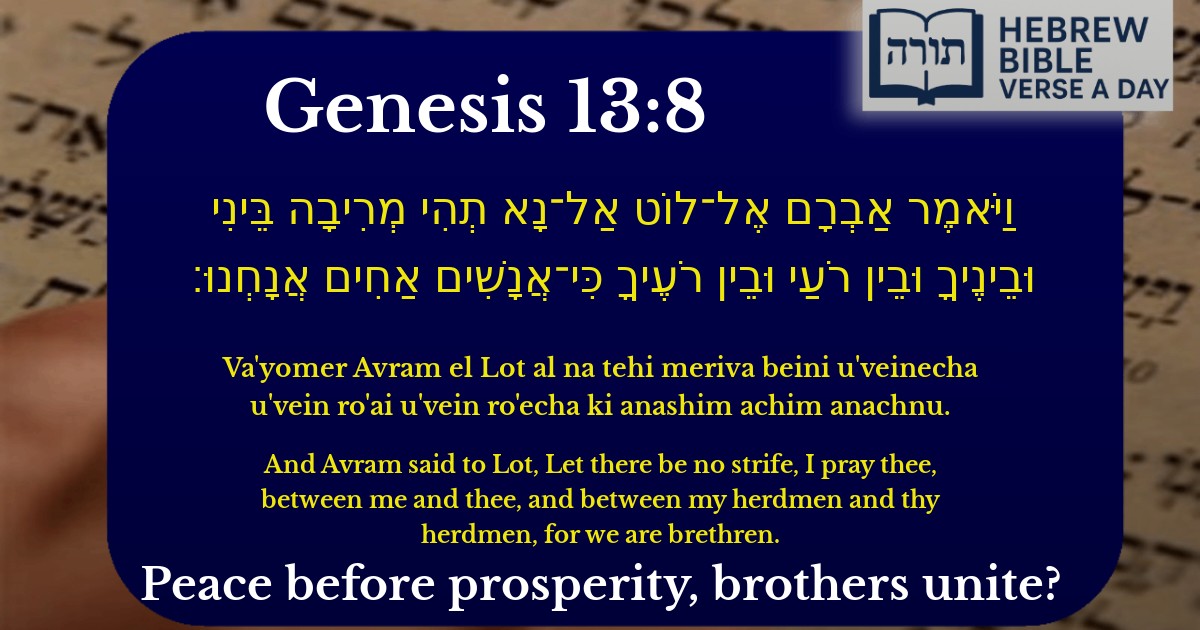Join Our Newsletter To Be Informed When New Videos Are Posted
Join the thousands of fellow Studends who rely on our videos to learn how to read the bible in Hebrew for free!
Hebrew Text
וַיֹּאמֶר אַבְרָם אֶל־לוֹט אַל־נָא תְהִי מְרִיבָה בֵּינִי וּבֵינֶיךָ וּבֵין רֹעַי וּבֵין רֹעֶיךָ כִּי־אֲנָשִׁים אַחִים אֲנָחְנוּ׃
English Translation
And Avram said to Lot, Let there be no strife, I pray thee, between me and thee, and between my herdmen and thy herdmen, for we are brethren.
Transliteration
Va'yomer Avram el Lot al na tehi meriva beini u'veinecha u'vein ro'ai u'vein ro'echa ki anashim achim anachnu.
Hebrew Leining Text
וַיֹּ֨אמֶר אַבְרָ֜ם אֶל־ל֗וֹט אַל־נָ֨א תְהִ֤י מְרִיבָה֙ בֵּינִ֣י וּבֵינֶ֔ךָ וּבֵ֥ין רֹעַ֖י וּבֵ֣ין רֹעֶ֑יךָ כִּֽי־אֲנָשִׁ֥ים אַחִ֖ים אֲנָֽחְנוּ׃
וַיֹּ֨אמֶר אַבְרָ֜ם אֶל־ל֗וֹט אַל־נָ֨א תְהִ֤י מְרִיבָה֙ בֵּינִ֣י וּבֵינֶ֔ךָ וּבֵ֥ין רֹעַ֖י וּבֵ֣ין רֹעֶ֑יךָ כִּֽי־אֲנָשִׁ֥ים אַחִ֖ים אֲנָֽחְנוּ׃
🎵 Listen to leining
Parasha Commentary
📚 Talmud Citations
This verse is quoted in the Talmud.
📖 Sanhedrin 109b
The verse is referenced in the context of discussing the dispute between Avram and Lot, illustrating the importance of peace and avoiding strife even among relatives.


Avraham's Pursuit of Peace
The verse (Bereishit 13:8) demonstrates Avraham Avinu's exceptional character in seeking to avoid conflict with his nephew Lot. Rashi explains that Avraham initiated this peaceful resolution despite being the elder and more righteous party, showing his humility and commitment to shalom bayit (domestic peace). The Midrash (Bereishit Rabbah 41:5) emphasizes that Avraham valued peace over material possessions, willingly offering Lot first choice of land to prevent strife.
The Phrase "Anashim Achim Anachnu"
Avraham's declaration "for we are brethren" carries deep significance. Ramban notes that this refers not merely to their biological relationship, but to their shared spiritual legacy as descendants of Terach who had rejected idolatry. The Kli Yakar adds that Avraham sought to remind Lot of their familial bond and shared values to prevent the dispute from escalating.
Halachic Principles of Conflict Resolution
This incident establishes important halachic principles regarding dispute resolution:
Contrast Between Avraham and Lot
The Malbim highlights the contrast between Avraham's conciliatory language ("I pray thee") and Lot's subsequent choice to dwell near Sodom, demonstrating how Avraham's righteousness was not inherited by his nephew. The Ohr HaChaim notes that Avraham's peaceful overture came after their possessions became too numerous to dwell together (13:6), showing his patience in waiting until absolutely necessary to address the issue.
Practical Lessons for Interpersonal Relationships
From this verse we learn: